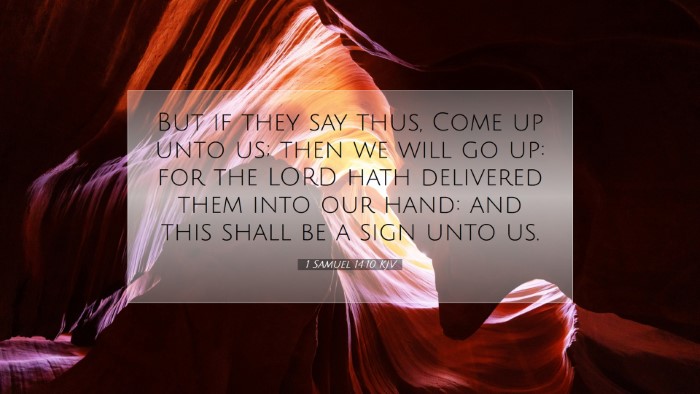Commentary on 1 Samuel 14:10
Verse Analysis: 1 Samuel 14:10 states, "But if they say, 'Come up to us,' then we will go up; for the Lord has delivered them into our hand. And this will be a sign to us." This verse captures a pivotal moment in the narrative of Jonathan’s bold initiative against the Philistines, laying groundwork for theological reflections on faith, obedience, and divine providence.
Contextual Background
The events of this chapter occur during a time of national crisis for Israel, where the Philistines posed a significant threat. Saul's kingship is marked by various challenges, and the men of Israel are in fear. Jonathan, the son of Saul, demonstrates remarkable faith by choosing to take action against the oppressors, reflecting a dynamic contrast with his father's hesitancy.
Key Themes
- Faith and Initiative: The verse highlights Jonathan's understanding of God's deliverance, which contrasts sharply with the prevailing fear within Israel. His declaration about waiting for a sign shows a balance of faith and practical strategy.
- Divine Significance: The request for a sign demonstrates a deep reliance on divine guidance. Jonathan trusts that the outcome of their mission will be indicative of God's will.
- God's Providence: Emphasizing that God is in control, even through seemingly small indicators, Jonathan showcases the concept that God uses ordinary means to fulfill His promises and provide for His people.
Commentary Insights
Matthew Henry's Commentary
Matthew Henry emphasizes the nobility of Jonathan's character. He notes that while Saul's army is paralyzed by fear, Jonathan's heart is stirred to act. He remarks on the faith required in seeking a sign from God, intertwining Jonathan's actions with the narrative of God’s providential care over Israel.
Albert Barnes' Notes
Albert Barnes highlights the strategic importance of Jonathan's plan. By suggesting they allow the Philistines to call them, he cleverly turns the situation to one of potential confidence and courage. Barnes reflects on how Jonathan’s faith was both practical and audacious, embodying a leader acting on divine assurance rather than mere human logic.
Adam Clarke's Commentary
Adam Clarke provides a detailed examination of the cultural context and the nature of signs in biblical faith. He points out that Jonathan’s call to battle was riddled with risks, yet it was his unwavering faith that led him to perceive God’s hand in the outcome of their encounter. Clarke also comments on the spiritual symbolism of needing signs and how it relates back to Israel’s history of God revealing Himself through signs and wonders.
Application for Today
The verse and its surrounding narrative invite readers to reflect on the nature of their faith in God. In a world filled with uncertainty, believers are encouraged to act with boldness rooted in divine assurance. Jonathan serves as a model of faith-led action; he teaches that believers should seek God's signs but remain willing to act courageously in the face of opposition.
Conclusion
1 Samuel 14:10 reverberates with themes of faith, divine guidance, and the importance of leadership in times of crisis. This commentary draws from historic interpretations that reveal the depth of theological insights present in this short yet impactful verse. For pastors, students, and scholars, it highlights the necessity of combining faith with action, trusting in God’s providence while navigating life's battles.


